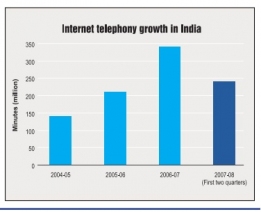Open Access - TRAI releases consultation paper on IP telephony

-
In a bid to make long distance calls over IP networks more accessible, the Telecom Regulatory Authority of India (TRAI) has brought out a consultation paper, "Issues Related to Internet Telephony". The initiative is directed at offering users the benefits of recent advancements in technology.
Already, with the advent of selective internet telephony in the country, international calls have become much cheaper compared to the still high call charges on public switched telephone networks (PSTNs)/public land mobile networks (PLMNs). In view of this, issues pertaining to internet telephony have attracted a lot of attention from policy-makers, regulators and end-users. However, the regulations for internet telephony are complex at the moment, which has been hindering service providers from offering the service.
In 2002, looking at the growing interest in internet telephony, the government initially allowed internet service providers (ISPs) to offer the service after signing an amended ISP licence. The scope of internet telephony was then limited, as restrictions were imposed on the type of technology as well as the devices that could be used.
In 2006, the Department of Telecommunications issued 128 internet telephony service provider (ITSP) licences. However, till end-2007, only 32 ITSPs had actually started offering services. Operators found several hurdles in the uptake of internet telephony. Significant among these was that the permitted technologies were not user friendly and that computer knowledge was a prerequisite.
Based on TRAI's recommendations, in 2007, the government modified its ISP licensing guidelines to incorporate the use of various user-friendly devices/ adapters to make internet telephony more accessible. However, ISPs were still not permitted to interconnect with PSTN/ PLMN exchanges to provide internet telephony. Then again, while unified access service providers and cellular mobile service providers were permitted to provide internet telephony in March 2006, they did not do so on account of the ambiguity in the definition of internet telephony in their licences. This created uncertainty about the scope of the service.
To bring greater clarity and resolve issues – particularly given the increasing popularity of internet telephony worldwide and the availability of enhanced network capabilities – TRAI has decided to review the key issues. The main dilemma for the regulator today is that if it bans internet telephony services, it would be restricting the fruits of technological advancement from reaching the common man, while permitting the same under various licences would raise concerns over the creation of a non-level playing field due to different regulatory levies.
The TRAI consultation paper works on the premise of technology neutrality and raises key queries and issues with regard to internet telephony. It discusses the need and timing for the liberalisation of the current regulatory restrictions on internet telephony in the licences of existing ISPs. It also reviews the international experience in this regard. The issues for consultation include:
- Most Viewed
- Most Rated
- Most Shared
- Related Articles
- Manufacturing Hub: India emerges as a ke...
- TRAI performance indicator report for Se...
- Prashant Singhal, partner, telecom indus...
- 2G spectrum scam: continuing controversy
- An Eventful Year: Telecom highlights of ...
- Telecom Round Table: TRAI’s spectrum p...
- Manufacturing Hub: TRAI recommends indig...
- Linking Up: ITIL to merge with Ascend
- High Speed VAS - Killer applications w...
- Bharti Airtel seals deal with Zain - Zai...






